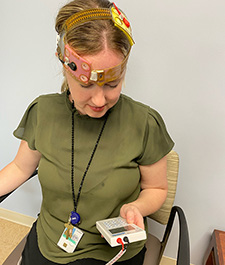Office of Research & Development |
 |


A VA-funded study aims to learn if a test for a specific gene—SLCO1B1—can help patients and doctors choose the right type and dose of statin drugs, while minimizing the muscle pain that sometimes occurs with statins. (Photo: ©iStock/PeopleImages)
August 28, 2018
By Mike Richman
VA Research Communications

Dr. Jason Vassy is a clinician-researcher at the VA Boston Healthcare System and an assistant professor at Harvard Medical School. (Photo by Pallas Wahl)
One of the most widely prescribed groups of drugs, statin medications are often used by people with high cholesterol, a risk factor for heart attack, heart disease, and stroke. They’ve been shown to help lower harmful cholesterol levels.
But statins can present troublesome side effects. The most common one is myopathy, a muscle injury that can range from mild aches to life-threatening damage. Women and people age 80 and older are at highest risk for statin myopathy.
Dr. Jason Vassy, a clinician and researcher at the VA Boston Healthcare System, is eager to learn whether pharmacogenetics can help in choosing the right statin medication. The relatively new field of medicine examines how a patient’s genetic make-up affects how he or she responds to particular drugs.
Vassy is leading a VA-funded study that aims to learn if a test for a specific gene—SLCO1B1—can help patients and doctors choose the right type and dose of statin drugs, while minimizing the muscle pain that sometimes occurs with statins.
"As both a primary care physician and a researcher, I hope my research will help doctors and patients decide whether pharmacogenetic testing is useful to improve medical care."
It’s known that people with a certain genetic change in SLCO1B1 are much more likely to have muscle aches from statin drugs, mainly simvastatin (sold as Zocor). Simvastatin and atorvastatin (sold as Lipitor) are the most commonly prescribed statins in VA and non-VA settings to reduce high cholesterol, according to Vassy.
A test in Vassy’s study will look for a single letter change in the SLCO1B1 gene that is known to be linked to statin muscle symptoms—essentially whether someone has a C or a T in the gene. The letters stand for different organic compounds that make up the gene: C means cytosine, and T means thymine. Because everyone has two copies of each gene, Vassy and his team will be eyeing both copies.
“The person could be a TT, CT, or CC,” he explains. “The CCs have the highest risk for statin myopathy, the CTs have a higher-than-normal risk but less than the CCs, and the TTs have just an average risk.”
Podcast: VA researcher hopes genetic test can help in choosing right drug to reduce high cholesterol
Vassy is also an assistant professor at Harvard Medical School. He says the medical community is hoping that pharmacogenetics will help patients and doctors make the right choice when it comes to statins. Genetic tests cost about $100 and are becoming much more widely available to doctors and patients than they were five years ago, he notes.
At the same time, he says, doctors typically do not consider genetic risk when prescribing a statin drug. More “carefully designed, rigorous studies” focusing on pharmacogenetics are needed so patients and doctors can make the best choices on statins, he adds. He describes his study as one of the first randomized controlled trials involving pharmacogenetics.
“There is limited randomized controlled trial data on the impact of SLCO1B1 testing on clinical outcomes,” he says. “As both a primary care physician and a researcher, I hope my research will help doctors and patients decide whether pharmacogenetic testing is useful to improve medical care.”
He adds: “Most pharmacogenetic research has consisted of what we call association studies, in which researchers look at groups of patients who did or did not have effects from medications. They analyze the patients’ genetic data to discover changes in one’s genetic make-up that may be linked to those effects. We’ve discovered a lot of important drug-gene associations from that kind of research. But fewer studies have tried to look at whether using those new discoveries in health care improves the way doctors take care of patients. My study aims to do that by using a randomized controlled trial design, the most rigorous kind of experiment.”

Injectable gel could help treat degenerative back pain

At-home brain stimulation and talk therapy show promise treating chronic pain and PTSD

Study outlines guidance for treating cancer patients who show a problematic pattern of opioid use
Millions of people take statin drugs to lower the risk of cardiovascular disease, the No. 1 killer of Americans and the leading cause of hospitalization in the VA health care system. Typically well-tolerated, statins are often combined with diet and exercise to reduce blood levels of low-density lipoprotein (LDL) cholesterol, known as “bad cholesterol.” Rosuvastatin (sold as Crestor) and pravastatin (sold as Pravachol) are other statins that are less commonly used than simvastatin and atorvastatin.
Muscle pain is the most common complaint of patients who take statins, which block the enzyme that the body uses to make cholesterol in the liver. The drug can also cause liver damage and diabetes, although both of those side effects are rare.
All statins pose the risk of myopathy, but the chances of muscle pain are greatest with simvastatin, Vassy notes. “The jury is still out on whether the SLCO1B1 test result holds true for atorvastatin myopathy the same way it does for simvastatin myopathy,” he says.
In 2012, the U.S. Food and Drug Administration approved safety label changes that would better inform the public about the potential of statins to cause liver problems, raise blood sugar levels, increase the risk of diabetes, and induce memory loss and confusion.
“The value of statins in preventing heart disease has been clearly established,” Dr. Amy Egan, deputy director for safety in FDA’s division of metabolism and endocrinology products, said at the time. “Their benefit is indisputable, but they need to be taken with care and knowledge of their side effects.”
Vassy and his colleagues recently completed enrollment for their trial. They enlisted 408 men and women who have never taken a statin drug but may need one soon because of their elevated risk for heart disease. The patients have been randomized evenly into two groups, one that will receive the SLCO1B1 test at baseline and one that will not.
The test results will be sent to the patients’ primary care providers. Over the next year, the researchers will see whether those results influence the statins that are prescribed and whether the patients report adverse side effects. It’s unknown at this point how many of the participants will end up taking statins.
“The patients in the arm that got the genetic test are told, `Okay, here’s your genetic result,’ ” Vassy says. “ `If in the future your doctor wants to start you on a statin drug, this test says simvastatin might be a risky medication for you because of the chance of muscle pain. You may want to think about a different drug.’ We then observe their clinical care for the next 12 months to see if they are started on a statin and, if so, what kind of statin. We want to see if the doctors use the genetic information to guide treatment, or if they ignore the genetic information and prescribe simvastatin anyway, even if the patient has a CC result. That would demonstrate that doctors didn’t think there’s value in this test because they didn’t use it in clinical decision-making.
“We know there’s a lot of concern among certain segments of patients about using statins in the first place,” he adds. “This genetic test, or the experience of getting genetic results, might also make patients say, `Statins sound like a bad idea. I don’t want to use them at all.’ ”
The patients who aren’t genetically tested at baseline are eligible to be tested at the end of the 12-month period.
In the end, Vassy and his team believe the SLCO1B1 test will guide doctors to use statin drugs that are “safer for their patients’ genetic make-up but are equally effective for lowering cholesterol and preventing heart disease,” he says.
The trial, he notes, is one of the first cases of introducing precision medicine to primary care in VA. Precision medicine aims to optimize efficiency or therapeutic benefit for patients, especially via genetic or molecular testing. The cost of a genetic testing program must be addressed before VA can consider implementing the program, he notes.
“Additional work needs to be done to find out how much this would cost,” he says. “So even if we see encouraging results from this study, a lot more questions must be answered before VA can think about implementing this at the national level. Having rigorous randomized clinical trial evidence of the impact of this test on patient care is a good first step.”
VA Research Currents archives || Sign up for VA Research updates